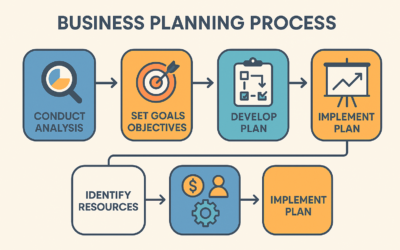A surprising number of business leaders are unaware of the differences between operational planning and strategic planning. While they have a close connection, it’s vital to have an understanding of their differences and how a company can put both kinds of plans to good use as they work towards their business goals.
The consultants here at GR-US.com regularly find that business leaders mistakenly think that they’ve created a strategic plan when in fact their planning has been operational in nature. Drawing up a list of long-term, medium-term and short-term projects and tasks is vital for the success of any organization, however, doing so does not constitute a strategic plan.
So, what is a strategic plan?
Strategic planning is a macro, high-level activity that will hone in on the priority strategic goals and areas of your organization in the medium to the long-term range. When you have a robust strategic plan, it acts as a map that you can follow from the place where your organization is today, to the place that you want to end up. Operational plans, on the other hand, focus on the weekly, daily or micro-actions that allow your team to achieve the company’s goals.
To put it briefly – operation is working in the business, a strategy is working on the business.
How To Maximize Your Strategic Plan
One of the most effective ways of thinking about your strategic plan is to look at your organization’s big picture. Your strategic plan acts as an outer layer encasing short-term, smaller actions that are your operational plan.
Your strategic plan should ask questions about your business like:
- What does your business do?
- Why does it do it?
- Who do you do it for?
- What are its weaknesses, strengths, threats, and opportunities?
- Which roadblocks or obstacles may be encountered?
- Where does the organization stand right now?
- Where do you want to take it in the future?
- Which main areas do you wish to concentrate on?
Select a few key goals and priorities to follow through and put in place a feedback loop so that progress is continually assessed and ongoing changes can be made at regular review meetings.
Although strategic plans are generally led by your company’s leadership team, employees should also be consulted to ensure that they take ownership of the final plan.
How To Maximize Your Operational Plan
Your operational plan will ideally support your strategic plan. While your strategic priorities will focus on just a few key areas that require reviewing on a regular basis, your operational plans may involve more items, including long-term, mid-term, short-term and single to-do projects. Although strategic plans tend to start at the organizational level, your operational plans will hone in on individual teams and departments and can focus on the daily necessities of running your business.
A strong strategic plan is vital for effective operational planning. If your team doesn’t have a clear understanding of where your company is heading, it’s virtually impossible to determine which operational projects and tasks can move the organization forward.
An operational plan will ask questions like:
- Which projects must we complete to achieve the business’s goals?
- Which daily tasks must be implemented, continued or stopped to function effectively?
- Who takes responsibility for which tasks?
- Will this action or task support the values, vision, and mission of our organization?
If every member of your team understandings the strategic direction of your organization and are all in alignment with where the business is heading, they’ll have a stronger understanding of the ways in which their daily tasks are able to propel the company forward. They’ll also be better equipped to model behaviors and make decisions that will support the values, vision, and mission of the organization.

0 Comments